Psychology Assignment: Emotional Intelligence Report Analysis
VerifiedAdded on 2020/05/11
|7
|1077
|217
Report
AI Summary
This report provides a reflective analysis of emotional intelligence within the context of psychology and counseling. It begins by defining emotional intelligence and empathy, exploring the intimate relationship between them. The report then delves into the connection between the intentional helping interviewing process and empathy, emphasizing their shared foundations in psychological counseling. A key component of the report is the inclusion and analysis of an emotional intelligence survey, reflecting the author's self-assessment and areas for improvement. The report concludes by highlighting the significance of emotional intelligence, supported by empathy, as crucial elements in the field of psychology, emphasizing their complementary roles in fostering success in both personal and professional spheres. The report also provides an overview of the literature review and research in the field to support the arguments made.
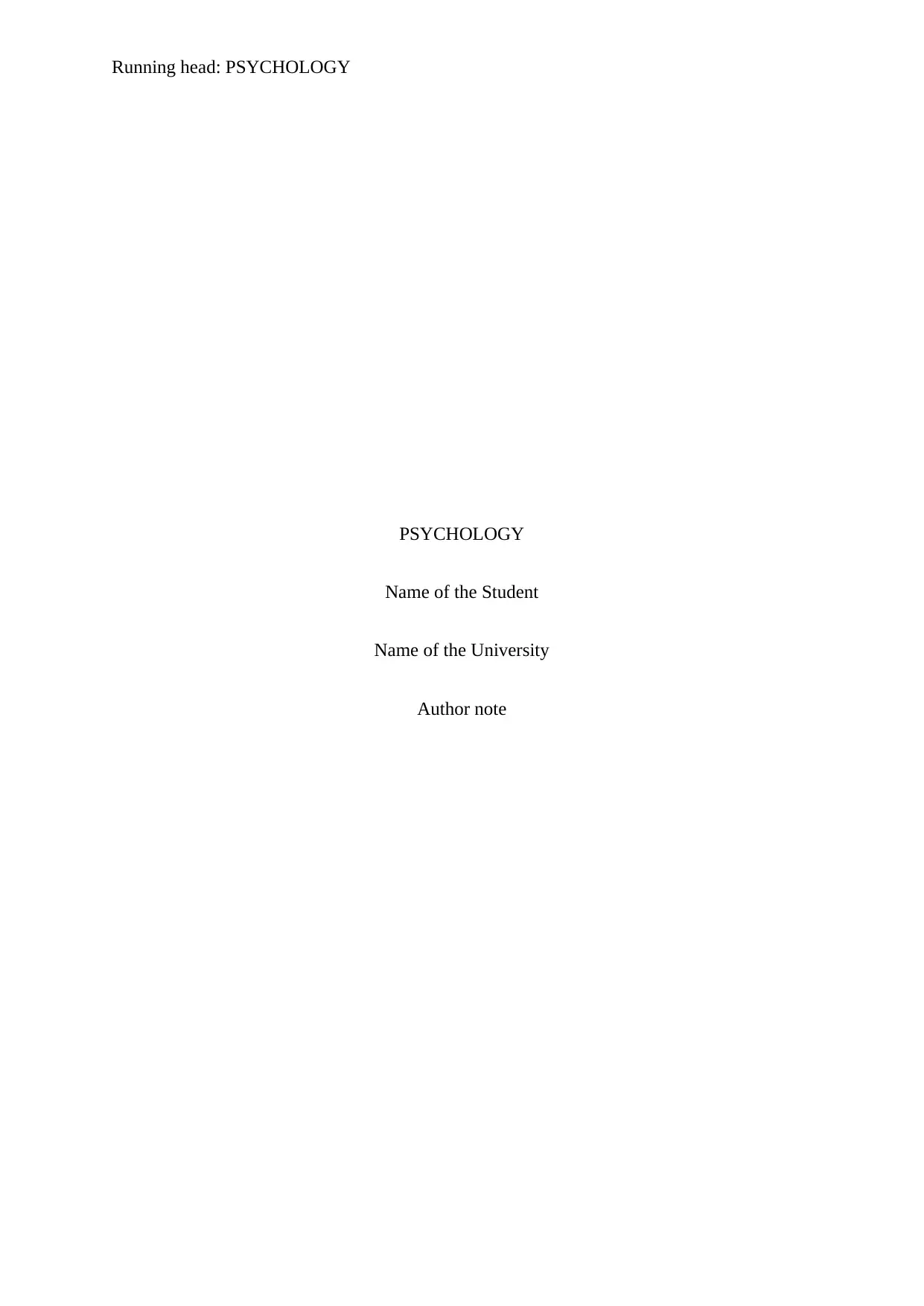
Running head: PSYCHOLOGY
PSYCHOLOGY
Name of the Student
Name of the University
Author note
PSYCHOLOGY
Name of the Student
Name of the University
Author note
Paraphrase This Document
Need a fresh take? Get an instant paraphrase of this document with our AI Paraphraser
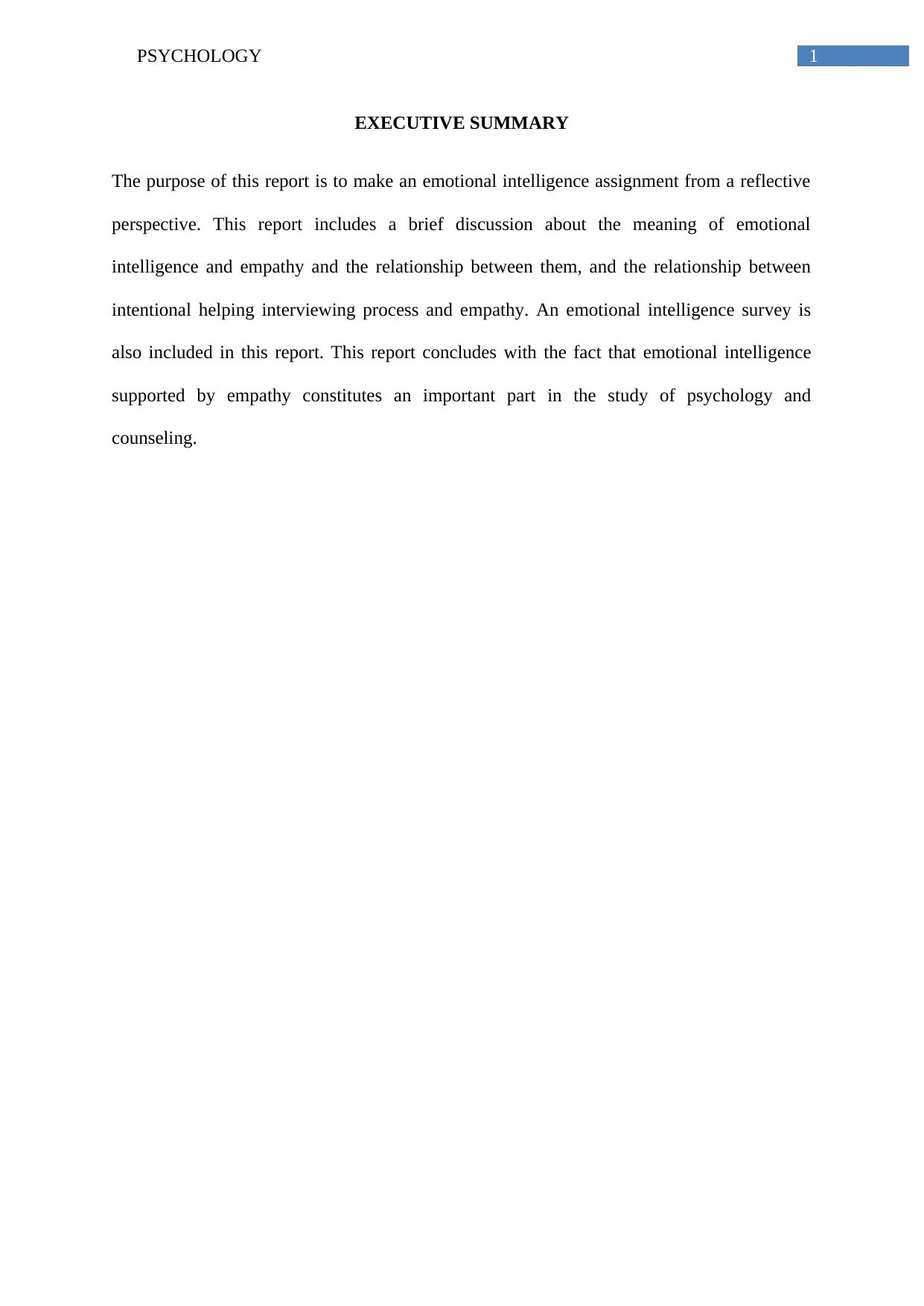
1PSYCHOLOGY
EXECUTIVE SUMMARY
The purpose of this report is to make an emotional intelligence assignment from a reflective
perspective. This report includes a brief discussion about the meaning of emotional
intelligence and empathy and the relationship between them, and the relationship between
intentional helping interviewing process and empathy. An emotional intelligence survey is
also included in this report. This report concludes with the fact that emotional intelligence
supported by empathy constitutes an important part in the study of psychology and
counseling.
EXECUTIVE SUMMARY
The purpose of this report is to make an emotional intelligence assignment from a reflective
perspective. This report includes a brief discussion about the meaning of emotional
intelligence and empathy and the relationship between them, and the relationship between
intentional helping interviewing process and empathy. An emotional intelligence survey is
also included in this report. This report concludes with the fact that emotional intelligence
supported by empathy constitutes an important part in the study of psychology and
counseling.
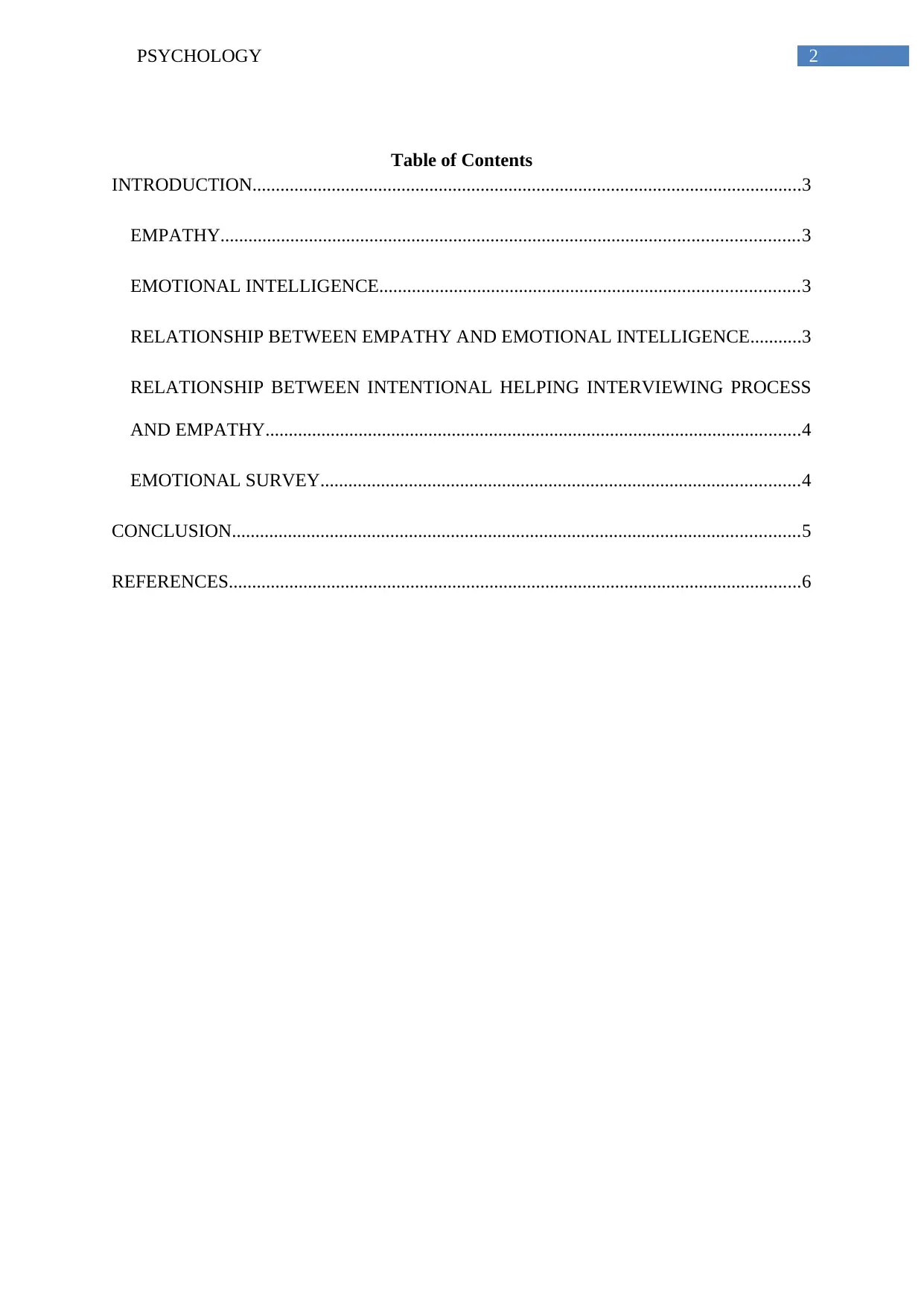
2PSYCHOLOGY
Table of Contents
INTRODUCTION......................................................................................................................3
EMPATHY............................................................................................................................3
EMOTIONAL INTELLIGENCE..........................................................................................3
RELATIONSHIP BETWEEN EMPATHY AND EMOTIONAL INTELLIGENCE...........3
RELATIONSHIP BETWEEN INTENTIONAL HELPING INTERVIEWING PROCESS
AND EMPATHY...................................................................................................................4
EMOTIONAL SURVEY.......................................................................................................4
CONCLUSION..........................................................................................................................5
REFERENCES...........................................................................................................................6
Table of Contents
INTRODUCTION......................................................................................................................3
EMPATHY............................................................................................................................3
EMOTIONAL INTELLIGENCE..........................................................................................3
RELATIONSHIP BETWEEN EMPATHY AND EMOTIONAL INTELLIGENCE...........3
RELATIONSHIP BETWEEN INTENTIONAL HELPING INTERVIEWING PROCESS
AND EMPATHY...................................................................................................................4
EMOTIONAL SURVEY.......................................................................................................4
CONCLUSION..........................................................................................................................5
REFERENCES...........................................................................................................................6
⊘ This is a preview!⊘
Do you want full access?
Subscribe today to unlock all pages.

Trusted by 1+ million students worldwide
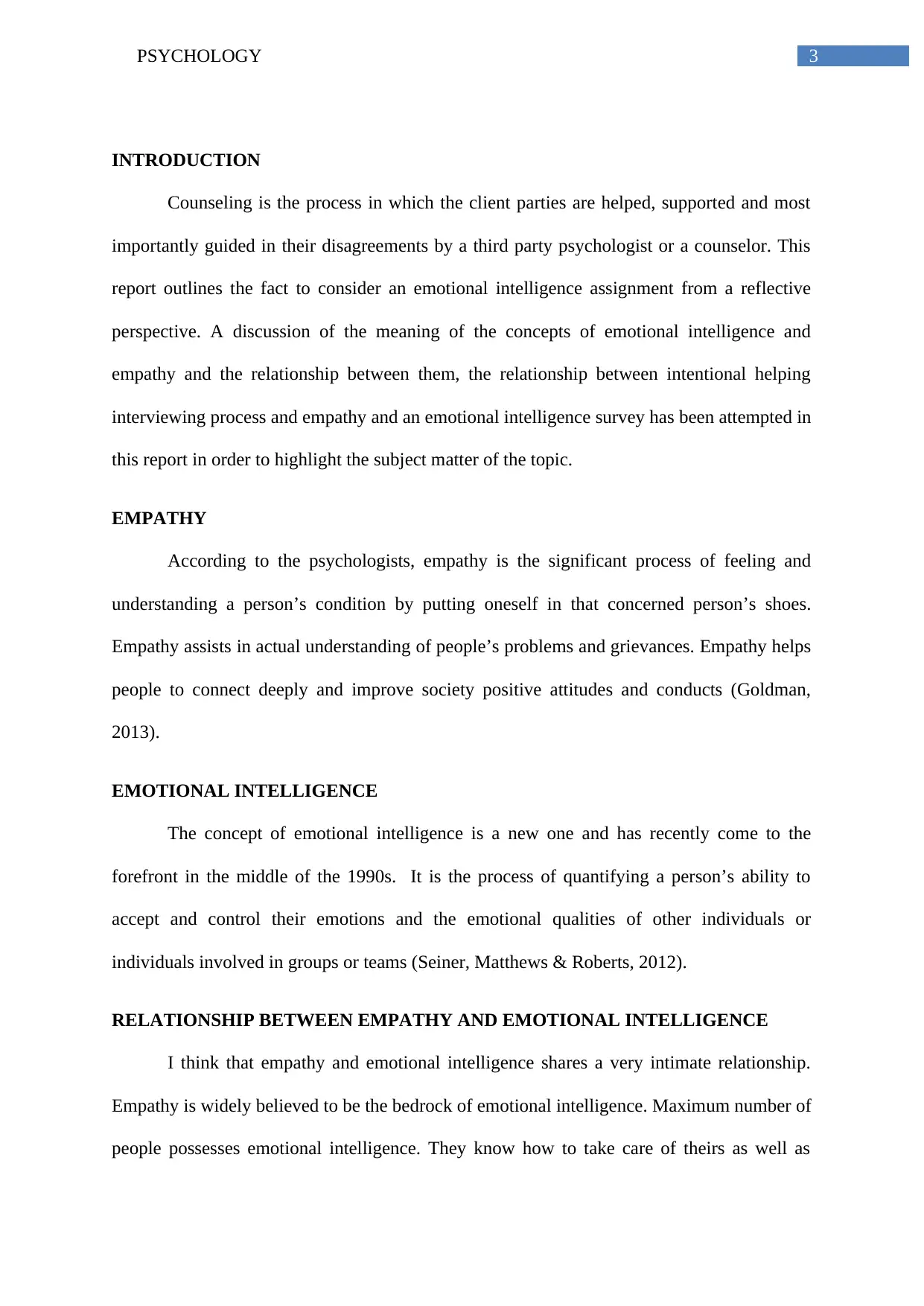
3PSYCHOLOGY
INTRODUCTION
Counseling is the process in which the client parties are helped, supported and most
importantly guided in their disagreements by a third party psychologist or a counselor. This
report outlines the fact to consider an emotional intelligence assignment from a reflective
perspective. A discussion of the meaning of the concepts of emotional intelligence and
empathy and the relationship between them, the relationship between intentional helping
interviewing process and empathy and an emotional intelligence survey has been attempted in
this report in order to highlight the subject matter of the topic.
EMPATHY
According to the psychologists, empathy is the significant process of feeling and
understanding a person’s condition by putting oneself in that concerned person’s shoes.
Empathy assists in actual understanding of people’s problems and grievances. Empathy helps
people to connect deeply and improve society positive attitudes and conducts (Goldman,
2013).
EMOTIONAL INTELLIGENCE
The concept of emotional intelligence is a new one and has recently come to the
forefront in the middle of the 1990s. It is the process of quantifying a person’s ability to
accept and control their emotions and the emotional qualities of other individuals or
individuals involved in groups or teams (Seiner, Matthews & Roberts, 2012).
RELATIONSHIP BETWEEN EMPATHY AND EMOTIONAL INTELLIGENCE
I think that empathy and emotional intelligence shares a very intimate relationship.
Empathy is widely believed to be the bedrock of emotional intelligence. Maximum number of
people possesses emotional intelligence. They know how to take care of theirs as well as
INTRODUCTION
Counseling is the process in which the client parties are helped, supported and most
importantly guided in their disagreements by a third party psychologist or a counselor. This
report outlines the fact to consider an emotional intelligence assignment from a reflective
perspective. A discussion of the meaning of the concepts of emotional intelligence and
empathy and the relationship between them, the relationship between intentional helping
interviewing process and empathy and an emotional intelligence survey has been attempted in
this report in order to highlight the subject matter of the topic.
EMPATHY
According to the psychologists, empathy is the significant process of feeling and
understanding a person’s condition by putting oneself in that concerned person’s shoes.
Empathy assists in actual understanding of people’s problems and grievances. Empathy helps
people to connect deeply and improve society positive attitudes and conducts (Goldman,
2013).
EMOTIONAL INTELLIGENCE
The concept of emotional intelligence is a new one and has recently come to the
forefront in the middle of the 1990s. It is the process of quantifying a person’s ability to
accept and control their emotions and the emotional qualities of other individuals or
individuals involved in groups or teams (Seiner, Matthews & Roberts, 2012).
RELATIONSHIP BETWEEN EMPATHY AND EMOTIONAL INTELLIGENCE
I think that empathy and emotional intelligence shares a very intimate relationship.
Empathy is widely believed to be the bedrock of emotional intelligence. Maximum number of
people possesses emotional intelligence. They know how to take care of theirs as well as
Paraphrase This Document
Need a fresh take? Get an instant paraphrase of this document with our AI Paraphraser
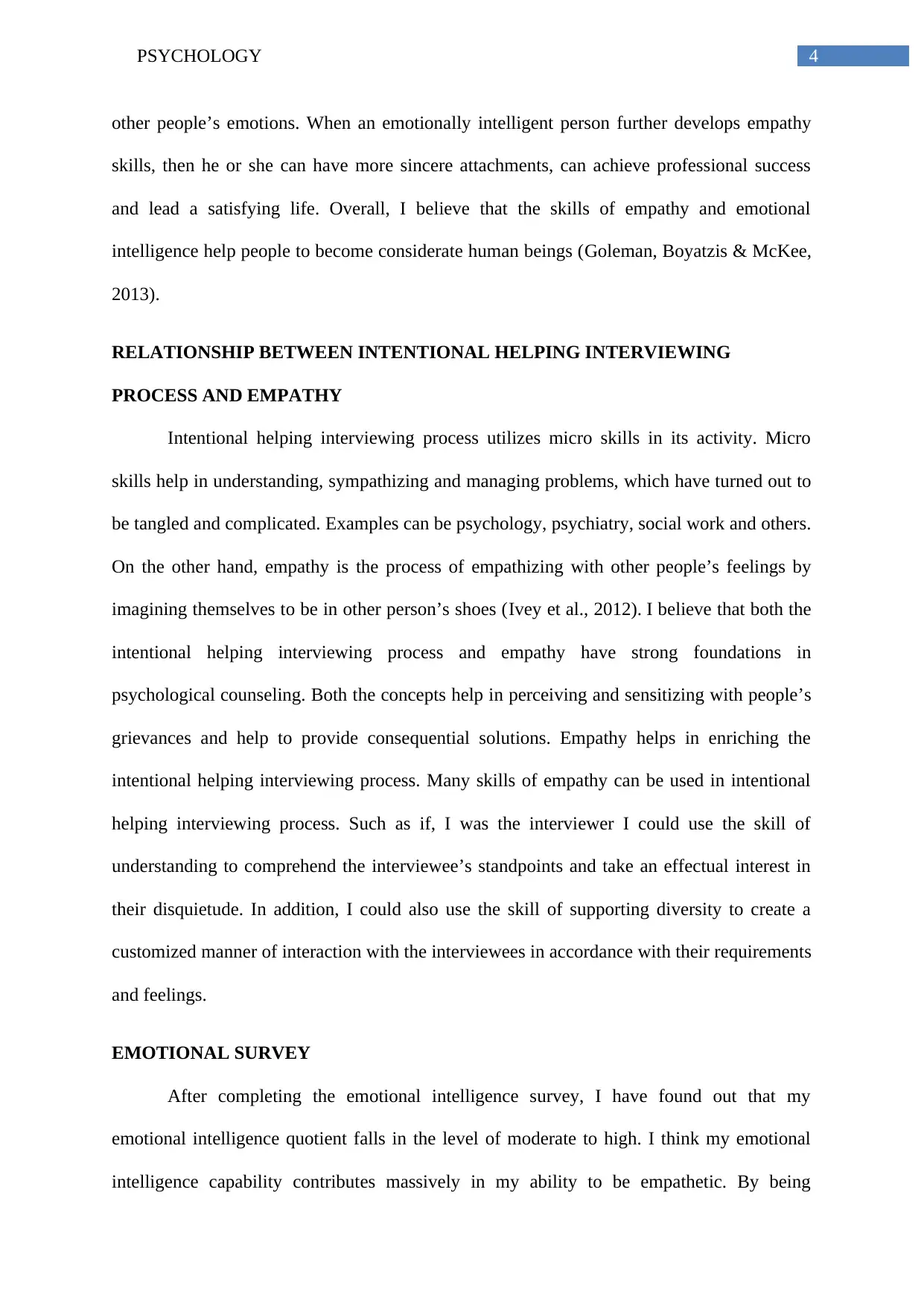
4PSYCHOLOGY
other people’s emotions. When an emotionally intelligent person further develops empathy
skills, then he or she can have more sincere attachments, can achieve professional success
and lead a satisfying life. Overall, I believe that the skills of empathy and emotional
intelligence help people to become considerate human beings (Goleman, Boyatzis & McKee,
2013).
RELATIONSHIP BETWEEN INTENTIONAL HELPING INTERVIEWING
PROCESS AND EMPATHY
Intentional helping interviewing process utilizes micro skills in its activity. Micro
skills help in understanding, sympathizing and managing problems, which have turned out to
be tangled and complicated. Examples can be psychology, psychiatry, social work and others.
On the other hand, empathy is the process of empathizing with other people’s feelings by
imagining themselves to be in other person’s shoes (Ivey et al., 2012). I believe that both the
intentional helping interviewing process and empathy have strong foundations in
psychological counseling. Both the concepts help in perceiving and sensitizing with people’s
grievances and help to provide consequential solutions. Empathy helps in enriching the
intentional helping interviewing process. Many skills of empathy can be used in intentional
helping interviewing process. Such as if, I was the interviewer I could use the skill of
understanding to comprehend the interviewee’s standpoints and take an effectual interest in
their disquietude. In addition, I could also use the skill of supporting diversity to create a
customized manner of interaction with the interviewees in accordance with their requirements
and feelings.
EMOTIONAL SURVEY
After completing the emotional intelligence survey, I have found out that my
emotional intelligence quotient falls in the level of moderate to high. I think my emotional
intelligence capability contributes massively in my ability to be empathetic. By being
other people’s emotions. When an emotionally intelligent person further develops empathy
skills, then he or she can have more sincere attachments, can achieve professional success
and lead a satisfying life. Overall, I believe that the skills of empathy and emotional
intelligence help people to become considerate human beings (Goleman, Boyatzis & McKee,
2013).
RELATIONSHIP BETWEEN INTENTIONAL HELPING INTERVIEWING
PROCESS AND EMPATHY
Intentional helping interviewing process utilizes micro skills in its activity. Micro
skills help in understanding, sympathizing and managing problems, which have turned out to
be tangled and complicated. Examples can be psychology, psychiatry, social work and others.
On the other hand, empathy is the process of empathizing with other people’s feelings by
imagining themselves to be in other person’s shoes (Ivey et al., 2012). I believe that both the
intentional helping interviewing process and empathy have strong foundations in
psychological counseling. Both the concepts help in perceiving and sensitizing with people’s
grievances and help to provide consequential solutions. Empathy helps in enriching the
intentional helping interviewing process. Many skills of empathy can be used in intentional
helping interviewing process. Such as if, I was the interviewer I could use the skill of
understanding to comprehend the interviewee’s standpoints and take an effectual interest in
their disquietude. In addition, I could also use the skill of supporting diversity to create a
customized manner of interaction with the interviewees in accordance with their requirements
and feelings.
EMOTIONAL SURVEY
After completing the emotional intelligence survey, I have found out that my
emotional intelligence quotient falls in the level of moderate to high. I think my emotional
intelligence capability contributes massively in my ability to be empathetic. By being
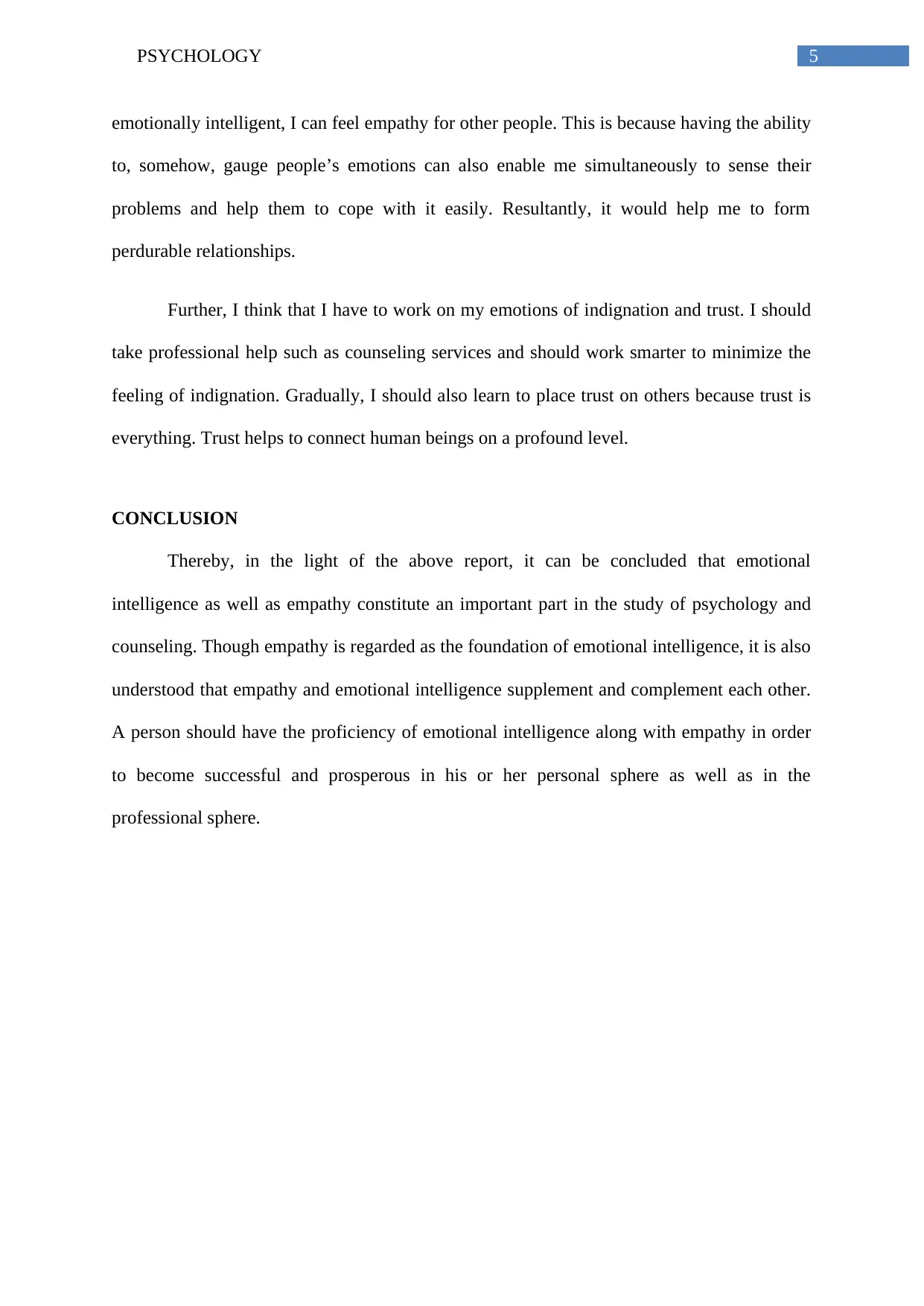
5PSYCHOLOGY
emotionally intelligent, I can feel empathy for other people. This is because having the ability
to, somehow, gauge people’s emotions can also enable me simultaneously to sense their
problems and help them to cope with it easily. Resultantly, it would help me to form
perdurable relationships.
Further, I think that I have to work on my emotions of indignation and trust. I should
take professional help such as counseling services and should work smarter to minimize the
feeling of indignation. Gradually, I should also learn to place trust on others because trust is
everything. Trust helps to connect human beings on a profound level.
CONCLUSION
Thereby, in the light of the above report, it can be concluded that emotional
intelligence as well as empathy constitute an important part in the study of psychology and
counseling. Though empathy is regarded as the foundation of emotional intelligence, it is also
understood that empathy and emotional intelligence supplement and complement each other.
A person should have the proficiency of emotional intelligence along with empathy in order
to become successful and prosperous in his or her personal sphere as well as in the
professional sphere.
emotionally intelligent, I can feel empathy for other people. This is because having the ability
to, somehow, gauge people’s emotions can also enable me simultaneously to sense their
problems and help them to cope with it easily. Resultantly, it would help me to form
perdurable relationships.
Further, I think that I have to work on my emotions of indignation and trust. I should
take professional help such as counseling services and should work smarter to minimize the
feeling of indignation. Gradually, I should also learn to place trust on others because trust is
everything. Trust helps to connect human beings on a profound level.
CONCLUSION
Thereby, in the light of the above report, it can be concluded that emotional
intelligence as well as empathy constitute an important part in the study of psychology and
counseling. Though empathy is regarded as the foundation of emotional intelligence, it is also
understood that empathy and emotional intelligence supplement and complement each other.
A person should have the proficiency of emotional intelligence along with empathy in order
to become successful and prosperous in his or her personal sphere as well as in the
professional sphere.
⊘ This is a preview!⊘
Do you want full access?
Subscribe today to unlock all pages.

Trusted by 1+ million students worldwide
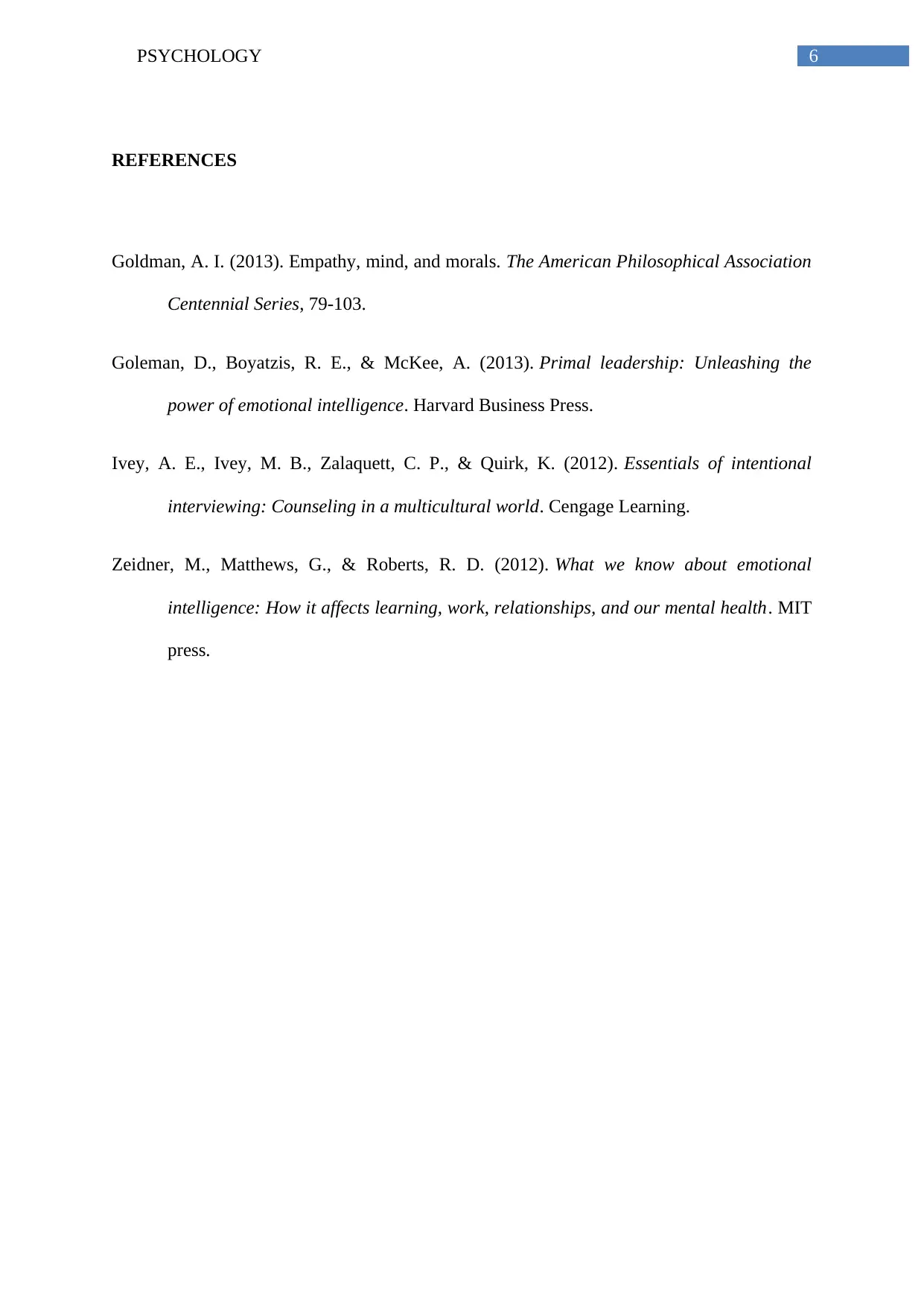
6PSYCHOLOGY
REFERENCES
Goldman, A. I. (2013). Empathy, mind, and morals. The American Philosophical Association
Centennial Series, 79-103.
Goleman, D., Boyatzis, R. E., & McKee, A. (2013). Primal leadership: Unleashing the
power of emotional intelligence. Harvard Business Press.
Ivey, A. E., Ivey, M. B., Zalaquett, C. P., & Quirk, K. (2012). Essentials of intentional
interviewing: Counseling in a multicultural world. Cengage Learning.
Zeidner, M., Matthews, G., & Roberts, R. D. (2012). What we know about emotional
intelligence: How it affects learning, work, relationships, and our mental health. MIT
press.
REFERENCES
Goldman, A. I. (2013). Empathy, mind, and morals. The American Philosophical Association
Centennial Series, 79-103.
Goleman, D., Boyatzis, R. E., & McKee, A. (2013). Primal leadership: Unleashing the
power of emotional intelligence. Harvard Business Press.
Ivey, A. E., Ivey, M. B., Zalaquett, C. P., & Quirk, K. (2012). Essentials of intentional
interviewing: Counseling in a multicultural world. Cengage Learning.
Zeidner, M., Matthews, G., & Roberts, R. D. (2012). What we know about emotional
intelligence: How it affects learning, work, relationships, and our mental health. MIT
press.
1 out of 7
Related Documents
Your All-in-One AI-Powered Toolkit for Academic Success.
+13062052269
info@desklib.com
Available 24*7 on WhatsApp / Email
![[object Object]](/_next/static/media/star-bottom.7253800d.svg)
Unlock your academic potential
Copyright © 2020–2025 A2Z Services. All Rights Reserved. Developed and managed by ZUCOL.





